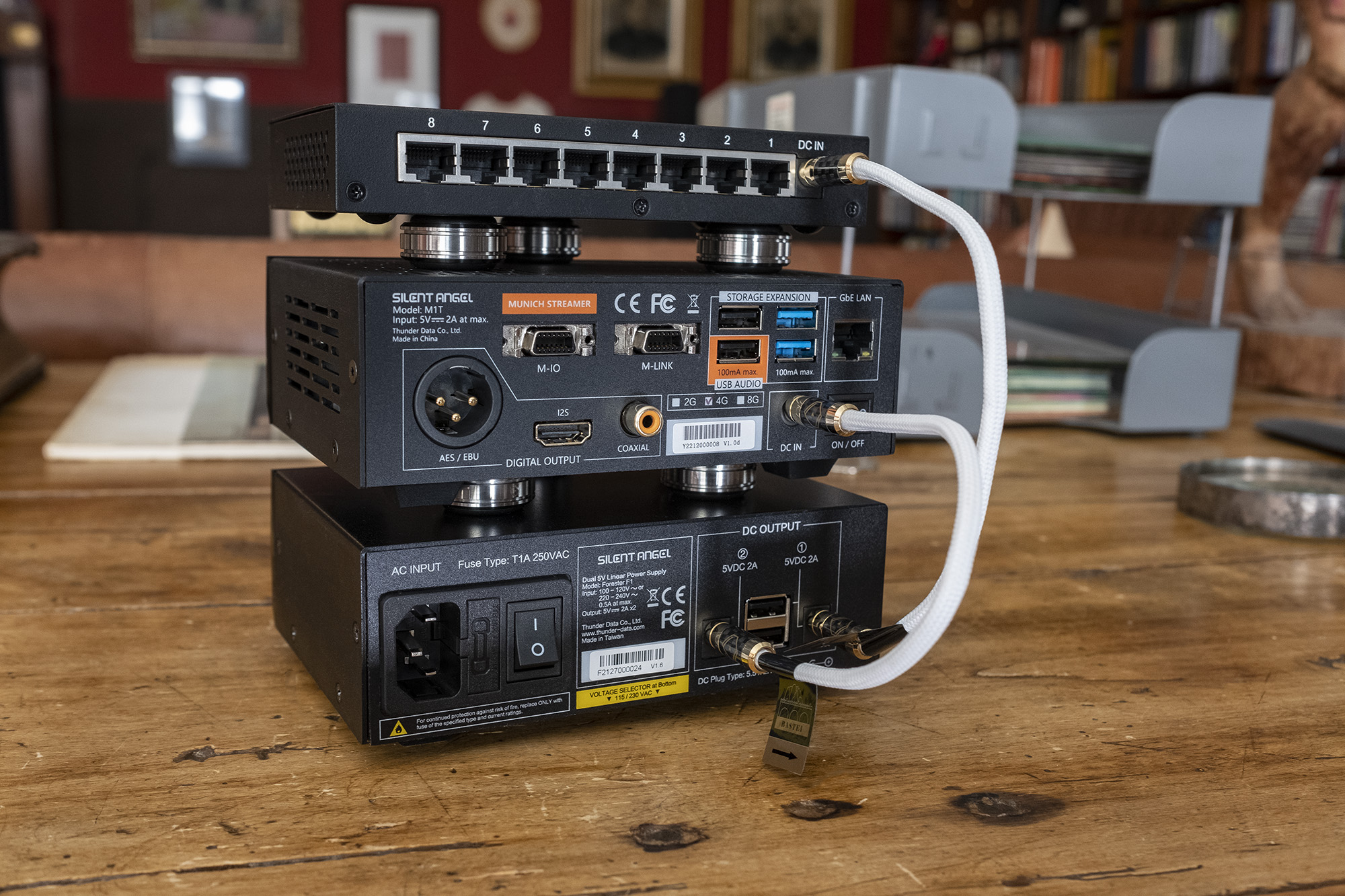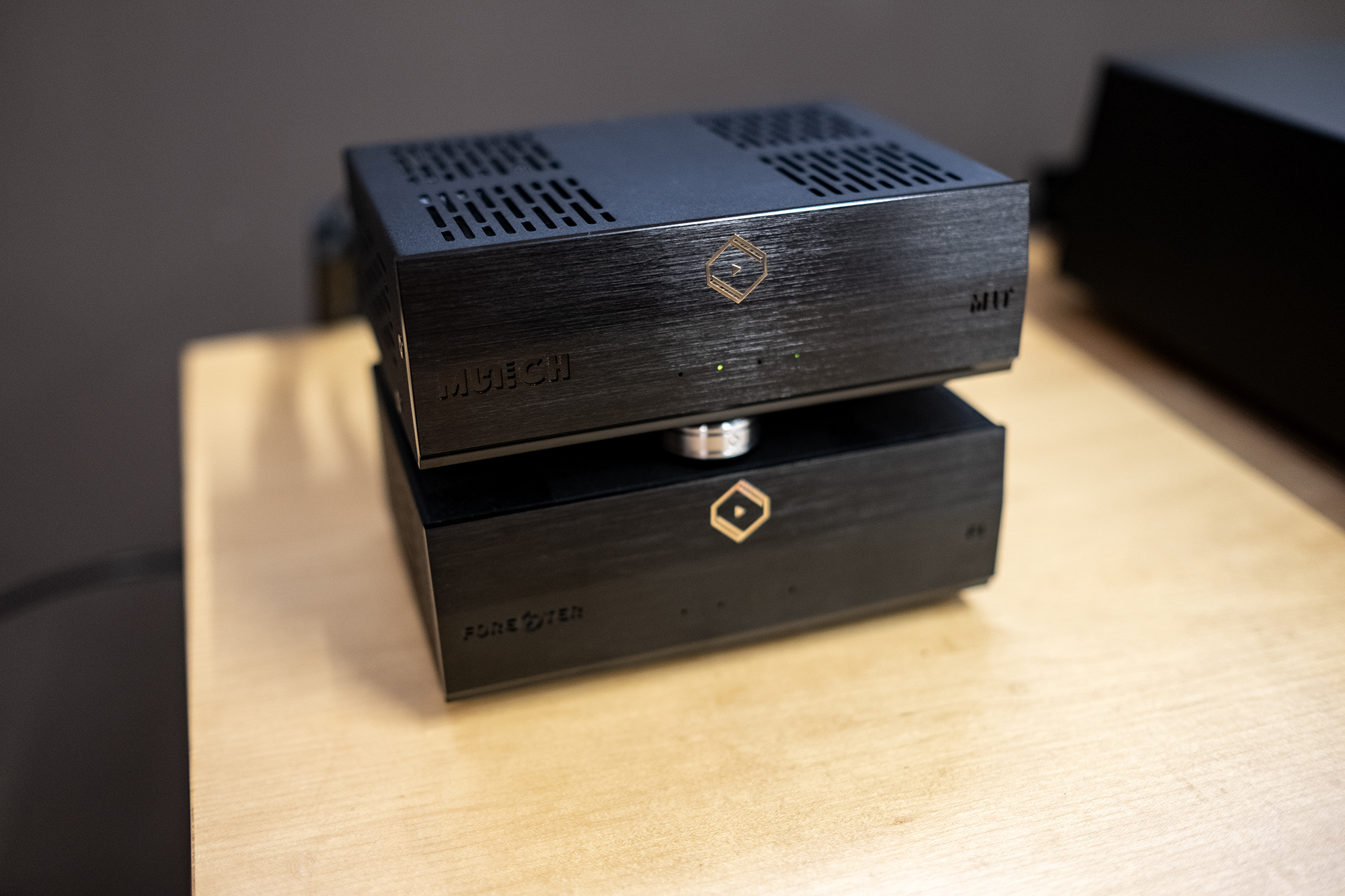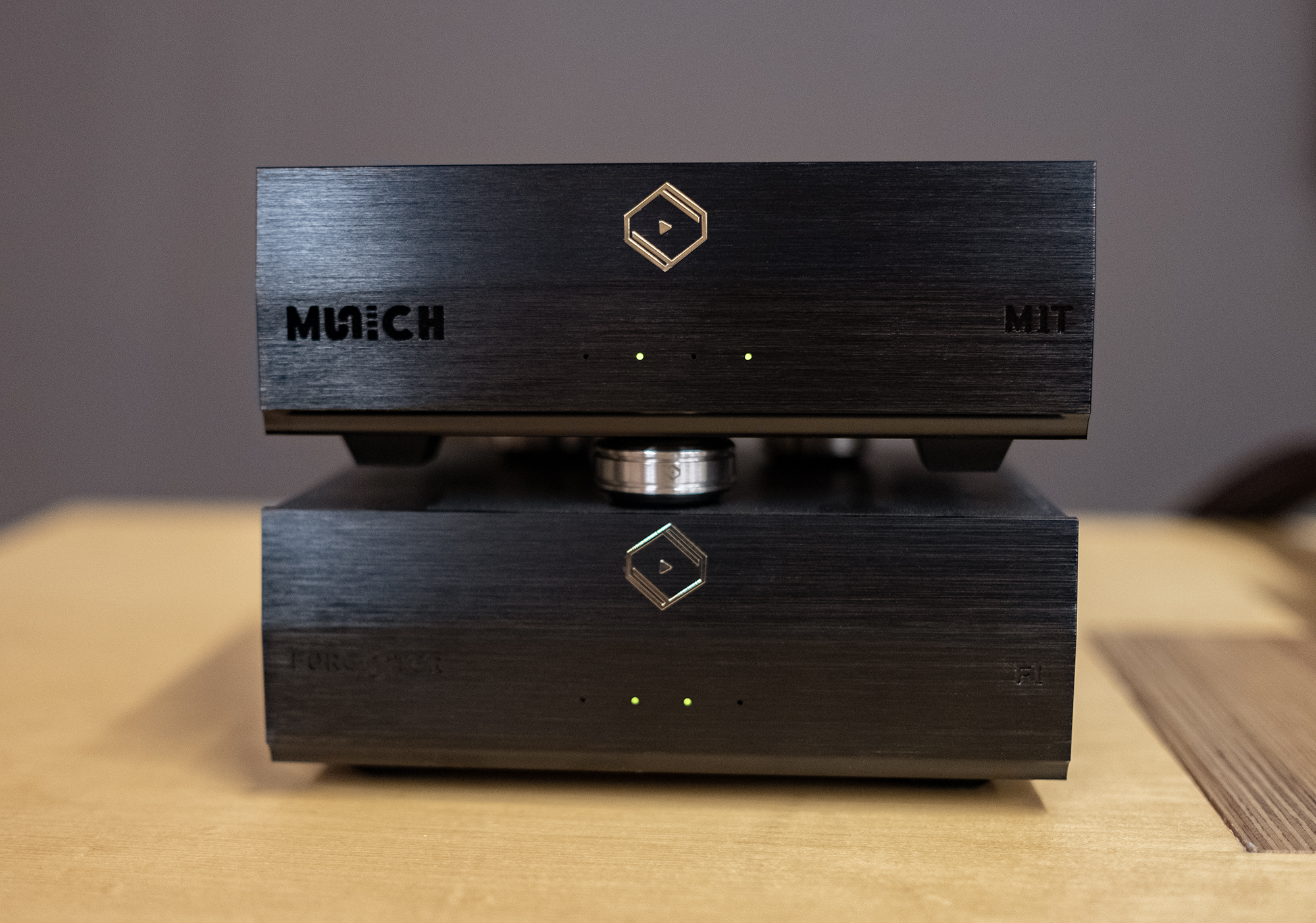
The Silent Angel stack, specifically the Munich M1T Streamer/Forester F1 combo, proved to offer a big slice of sonic goodness in a small package.
The Munich M1T Streamer has four digital outputs—AES, Coax, I2S over HDMI, and USB—and offers a number of USB ports for attaching USB storage all wrapped in a small (6″ wide) black metal enclosure with a black aluminum faceplate. Inside, a number of features are said to improve the M1T’s sonic performance.

From Silent Angel:
Elegant metal enclosure with a solid aluminum alloy front panel
High-performance yet low-power CPU, 4-core 1.5GHz ARM Cortex-A72
Substantial system memory (up to 8GB) for large streaming buffers and caches to run multiple applications simultaneously
Advanced circuitry with high quality components
Fan-less heat dissipation with a highly efficient heat-sink (~20˚C lower after applied)
A highly permeable EMI absorber (>120 @1MHz) to reduce electrical interference
I prefer AES so that’s the way I rolled with the Munich M1T connected to the totaldac d1-tube DAC (review) for the majority of the review period, using a length of AudioQuest Diamond AES cable. I also gave the Munich M1T a run, over USB, with the review Sonnet Pasithea DAC (more info).

I used Roon to control playback throughout the review period but Munich M1T owners can choose to use the free VitOS iOS app to control playback and access setup features including settings for the USB Audio output.

I’ve reviewed a lot of streaming devices over the last 10 years, ranging in price from hundreds of dollars to thousands. On a practical level, the Munich M1T is the least expensive streamer I’ve come across that offers AES output (if memory serves), which means a lot to me since the totaldacs I’ve owned and own sound best when fed AES. This also holds for other DACs I’ve reviewed making AES my preferred connection when available. Using the Munich M1T with the totaldac d1-tube DAC/Streamer, bypassing its internal streamer, showed the Munich to be more than up to the task of delivering a clear, clean signal for the totaldac to decipher into analog loveliness.
On the Natural Information Society’s descension (Out of Our Constrictions), saxophonist Evan Parker joins Josh Abrahms & Co. for a live at London’s Cafe OTTO 75-minute excursion into free jazz’s furthest boundaries. From Theaster Gates’ liner notes, “The possibility of a never-ending breath allows for the weaving of complex explorations of tonal possibility between harmonium, guimbri, drum, & horn that leads to non-conventional strategies of harmony & unity. The rhythmic engine further develops the pulse, shifting the sounds from recognizable forms to other worlds of sound development & masterful play.” Masterful play indeed and the subtle interplay and acoustic voices sounded out beautifully from this system with the Munich M1T driving the stream to the totaldac d1-tube. I paired this digital front end with my Leben CS600 Integrated Amp driving the DeVore O/96, a system I know all-too-well, and was delighted with its effortless and ripe free flowing sound.
This put the Silent Angel Munich M1T in much more expensive company but the system sound bore no trace of budget. Nice.
For some reason, the year end and beginning had me longing for contemporary jazz, odd in that I’d been away from it for some time. Guitarist Jeff Parker is among my favorite recent finds and Forfolks has seen extended plays of late. Solo guitar can be a difficult thing to pull off for an album’s worth of time but Parker is a master at bending time into all manner of shapes and sounds. Once again, this system with the Munich M1T taking care of bit delivery delivered a stream of consciousness fluidity with superb resolution, body, and rich harmonic voice. I’ve heard lessor streamers smear things up, making music sound overly bloated, too ripe and bit soft, as if it had been left on the shelf past its prime. My old Bluesound Node is a HiFi Bargain, but it does not offer the last word in refinement. Compared to the Munich M1T, the Node makes music sound fuzzy and dark.

I was also sent the Silent Angel Forester F1 Linear Power Supply which I used with the Munich for most of the review period because it offered a clear and welcome improvement. Compared to plugging straight into the wall with the included power cord, the Forester F1 made the Munich M1T sound more suave, more capable of delivering the subtle nuance of micro moments and delivering a bit more bite and punch to dynamic events. To my mind, the Forester is an easy choice at its $599 asking price

The Sonnet Pasithea DAC is proving to be another compelling candidate for those looking for a digital replay that bears little trace of its binary roots. I connected the Munich M1T to the Pasithea via USB, a change that required the use of the free VitOS app on my iPhone. In addition to offering full playback capabilities from NAS, Internet Radio, and Spotify, the VitOS app provides device setup for the Munich M1T. A quick tap on “External USB DAC (Sonnet)” and I was rolling in a flash.
Kathleen Frances’ Through The Blue is a stunning EP’s worth of songs for longing. Voice, a rich baritone, and piano take the lead and delicacy, detail, and a crazy sense of intimacy make this music intoxicating and the Munich M1T once again held up its end making for a system rich and resoundingly captivating. When we listen in to quieter moments, like a carefully inflected phrase, timing, nuance, and tone are all important and there’s no hiding a lack of resolution or system generated noise that can blur fine details. Through The Blue was offered up in stunning clarity by the Munich M1T/Pasithea combo, a crystalline sound image to lose oneself within.

A streamer has a fairly simple job to do—take in a network connection via Ethernet and turn it into digital audio out. Like most simple jobs, there are any number of things to get wrong along with getting the obvious right. The Silent Angel Munich M1T Streamer proved to do a masterful job while offering a host of digital outputs including AES at a very nice price. Highly recommended.

The Silent Angel Bonn N8 Audio Grade Network Switch
The Silent Angel Bonn N8 Audio Grade Network Switch ($549) is said to improve hifi performance by delivering a less noisy signal with lower “network latency issues and jitter effects.” The company provides some comparative graphs showing the “Jitter Effect” of the Bonn 8 vs. an unnamed “General Switch” so you can take that for what it’s worth. I will say that things like network latency and jitter effects are real, but that’s not to say they’re a universal problem that everyone needs to address, let alone with an audiophile-grade Ethernet switch.
My $29 TRENDnet 8-Port Gigabit GREENnet Switch appears to do the job just fine for my modest networking requirements—I have a dedicated network in the Barn, so there’s no other network traffic outside of me and my hifi. But for the purposes of this review I did what I always do with a piece of kit in Barn—I listened.
To flesh things out further, I ran a length of AudioQuest Cinnamon Ethernet cable from my TRENDnet switch to my router (ASUS RT-AT68U) and another length of the same cable from the Silent Angel Bonn N8 to the router. Both switches were powered on, so I switched Ethernet connections between the two on-the-fly. These Ethernet connections included the Ethernet cable running out to my hifi, to my NAS, and to my Small Green Computer sonicTransporter i5 that runs Roon Core.
It’s also worth noting that the Barn has its own electrical panel so in terms of electrical noise, the Barn is a fairly benign environment. I also have all of the network stuff plugged into a Furman Power Station Series PST‑8 Line Conditioner which is plugged into a different circuit than my hifi, which is plugged into an AudioQuest Niagara 3000. I also use a DJM Electronics GigaFOILv4 – INLINE Ethernet filter inline between the Ethernet switch and the hifi, a device that provides galvanic isolation and EMI/RFI filtering.
I did some rather rapid A/B comparisons with a bunch of different music [footnote 1] as well as longer stretches of listening with both switches in place and in the end, I did not hear a discernible difference from the sound of music playing through my hifi between the two Ethernet switches. There were moments, albeit fleeting, where I thought I may have been hearing better separation from dense music with the Bonn N8 switch, but longer listening time made this perception disappear.
1. “Comparison is the death of joy.” Mark Twain
Manufacturer’s Response
Dear Mr. Lavorgna,
On behalf of Silent Angel, I’d like to thank you and Twittering Machines for your thorough and insightful review of our Munich M1 Streamer and Forester F1 Linear Power Supply. Your comparisons of our components to much more expensive products (“the system sound bore no trace of budget. Nice.”) and to their “…effortless and ripe, free flowing sound” mirror my own experiences with Silent Angel productsand inspired me to work for the company: I’m delighted you heard what I heard!
As far as the Bonn N8, I understand your findings: having a completely separate building with a network dedicated specifically to your audio system is the ideal state of affairs and something that very few music lovers—myself included—can accomplish. Most of us have a house full of computer gear, televisions, cable boxes, phones, etc. pumping noise onto their networks, all of which compete for bandwidth and create a hostile environment for delicate digital audio signals. It is for these individuals that Bonn N8 was developed and this Switch should provide significant improvements in such environments. In the months since we submitted review samples to Twittering Machines, Silent Angel has developed more advanced and higher performance Network Switches, Linear Power Supplies and assorted other products which might well improve your system performance. We’re happy to submit these to you for review.
Again, thanks so much for your balanced and thoughtful review of Silent Angel Products.
Anthony Chiarella
Principal
Specialty Sound & Vision
Silent Angel Munich M1T Streamer
Price: $1199
Forester F1 Linear Power Supply
Price: $599
Silent Angel Bonn N8 Audio Grade Network Switch
Price: $549
Company Website: Silent Angel
US Distributor Website: Specialty Sound & Vision
Munich M1T Streamer Specifications
| Available Color | Black |
| Power Consumption | 10W at max |
| Headphone Jack | 6.35 mm headphone jack x 1 33 Ohm
590 Ohm
|
| Digital Outputs | AES/EBU port x 1 I2S port x 1* Coxial port x 1 – Supports up to PCM 384KHz and DSD 5.6M (DSD128)* I2S output signal is not compatible with Holo Audio’s DAC |
| USB Audio | USB Audio port x 1 – Supports up to PCM 768KHz and DSD 11.2M (DSD256) |
| Analog Output | RCA (L+R) – 2Vrms THD+N : 0.00134 / 0.00164% – Frequency response : 20Hz ~20KHz+- 0.5dB – SNR : 108dB |
| USB | USB 3.0 x 2 USB 2.0 x 1 – Above USB ports are for external storage |
| M-IO | M-IO x 1* *Reserved. To be enabled by future firmware upgrade |
| M-LINK | M-LINK x 1* *Reserved. To be enabled by future firmware upgrade |
| Ethernet | 1 GbE RJ45 x 1 |
| Music Format | AAC, M4A, MP3, OGG, FLAC, WAV, ALAC, DSD(DSF, DFF), WAV64, AIFF, CUE files, WMA, APE |
| Gapless Playback | Supported |
| MQA Handling | The M1 will transmit the signal to the DAC which supports MQA decoding. MQA is supported only by connecting to the USB-audio port. |
| LED Indicator | Mute LED x 1 Power LED x 1 Digital Output LED x 2* *Yellow light on when in DSD format / Green light on when in PCM format |
| Temperature | Operating: 32 ~ 86 °F Storage: -4 ~ 158 °F |
| Humidity | Operating: 10% ~ 90% RH (non-condensing) Storage: 5% ~ 95% RH (non-condensing) |
| Dimensions | 6.11(W) inch x 1.99(H) inch x 4.34(D) inch |
| Weight | 2.21 lbs |

